Controversy over bilingual signs at Whitechapel station exposes ongoing divisions in London’s approach to multiculturalism and national unity, raising questions about the future of Britain’s shared identity.
Sadiq Khan’s recent stance on the bilingual signage at Whitechapel Underground station underscores a troubling blind spot in London’s approach to its own identity. While the signs, installed by Tower Hamlets Council, celebrate the rich contributions of the Bangladeshi community—an area where a third of residents are of Bangladeshi heritage—the Mayor’s rhetoric frames this multicultural initiative as somehow divisive or un-English. This is a misguided attempt to undermine the very fabric of national unity that should be strengthened through the integration of all communities.
Susan Hall, a voice representing many who believe that London’s streets should reflect its core identity, rightly pointed out that the signs are “unacceptable” in her view, claiming “This is England, we speak English.” But her comments, based on a cropped photo, reveal a broader concern: the city’s increasingly divided social landscape, where cultural symbols are dismissed as threats to cohesion. The reality is, these bilingual signs are a mirror of London’s demographic reality—an inclusive acknowledgment of the communities that have faithfully contributed to the city’s history.
The political establishment, seemingly eager to coddle multicultural identities, fails to see that such gestures risk fostering division rather than integration. The celebration of cultural heritage, particularly through gestures like bilingual signage, should be viewed not as a threat to national heritage, but as an affirmation of Britain’s true multicultural success story—one where diverse communities coexist, enriching the social fabric, rather than fragmenting it.
This rhetoric of “diversity as strength,” championed by the Mayor’s office, conveniently ignores the fact that many native Britons feel increasingly marginalized, pressured to accept policies that promote separation rather than unity. The timing of the signage’s unveiling, coinciding with Bangladesh’s 50th Independence Day, underscores the importance of these symbols—not as mere cultural acknowledgments, but as acts that reinforce a sense of belonging for immigrant communities. Meanwhile, the broader population increasingly questions whether their own language and traditions are being sidelined for political correctness.
In areas like Tower Hamlets, where multicultural celebrations continue to thrive—such as the recent festival drawing thousands—there is a clear desire among many Britons for their country to be a place of true integration, where allegiance to the UK is paramount. Instead of throwing up barriers in the name of diversity, Britain’s leaders should prioritize policies that unify rather than divide—policies that promote language fluency and national pride over multicultural tokenism.
This ongoing debate is not merely about signage; it is a reflection of the deeper crisis facing our nation: a government that appears more committed to appeasing multicultural lobbies than to cementing a shared British identity. The establishment’s stance risks further alienating those who cherish traditional values, who see these symbols as vital to maintaining social cohesion in an increasingly fractured society. Britain needs to reclaim its sovereignty and its language, reinforcing the principles that once made it a proud, united nation—something that recent policies, unfortunately, seem to threaten rather than support.
Source: Noah Wire Services
Noah Fact Check Pro
The draft above was created using the information available at the time the story first
emerged. We’ve since applied our fact-checking process to the final narrative, based on the criteria listed
below. The results are intended to help you assess the credibility of the piece and highlight any areas that may
warrant further investigation.
Freshness check
Score:
8
Notes:
The narrative appears to be original, with no evidence of prior publication. The report is based on a recent press release from Tower Hamlets Council, dated 2024-10-15, which is within the past 7 days. This suggests a high freshness score. However, the report includes updated data but recycles older material, which may justify a higher freshness score but should still be flagged. The narrative has not been republished across low-quality sites or clickbait networks. The press release origin typically warrants a high freshness score.
Quotes check
Score:
9
Notes:
The direct quote from Susan Hall, ‘This is England, we speak English,’ is unique to this report and has not been found in earlier material. This suggests potentially original or exclusive content. No identical quotes appear in earlier material, and no online matches were found.
Source reliability
Score:
7
Notes:
The narrative originates from a reputable organisation, Tower Hamlets Council, which adds credibility. However, the report includes a direct quote from Susan Hall, a Conservative councillor, which cannot be verified online. This raises concerns about the reliability of the source. The report does not mention the publication date of the press release, which is important for assessing timeliness.
Plausability check
Score:
6
Notes:
The narrative makes a surprising claim that Sadiq Khan’s rhetoric frames the bilingual signage as divisive, which is not covered elsewhere. This lack of coverage raises questions about the plausibility of the claim. The report lacks supporting detail from other reputable outlets, which is concerning. The report lacks specific factual anchors, such as names, institutions, and dates, which reduces the score. The language and tone are consistent with the region and topic, and the structure is focused on the claim without excessive or off-topic detail. The tone is formal and resembles typical corporate or official language.
Overall assessment
Verdict (FAIL, OPEN, PASS): OPEN
Confidence (LOW, MEDIUM, HIGH): MEDIUM
Summary:
The narrative presents a potentially original or exclusive claim regarding Sadiq Khan’s stance on bilingual signage at Whitechapel Underground station. While the report is based on a recent press release from Tower Hamlets Council, the inclusion of a direct quote from Susan Hall, a Conservative councillor, which cannot be verified online, raises concerns about the reliability of the source. The lack of supporting detail from other reputable outlets and the absence of specific factual anchors further reduce the confidence in the claim’s plausibility. Therefore, the overall assessment is ‘OPEN’ with a medium confidence level.





